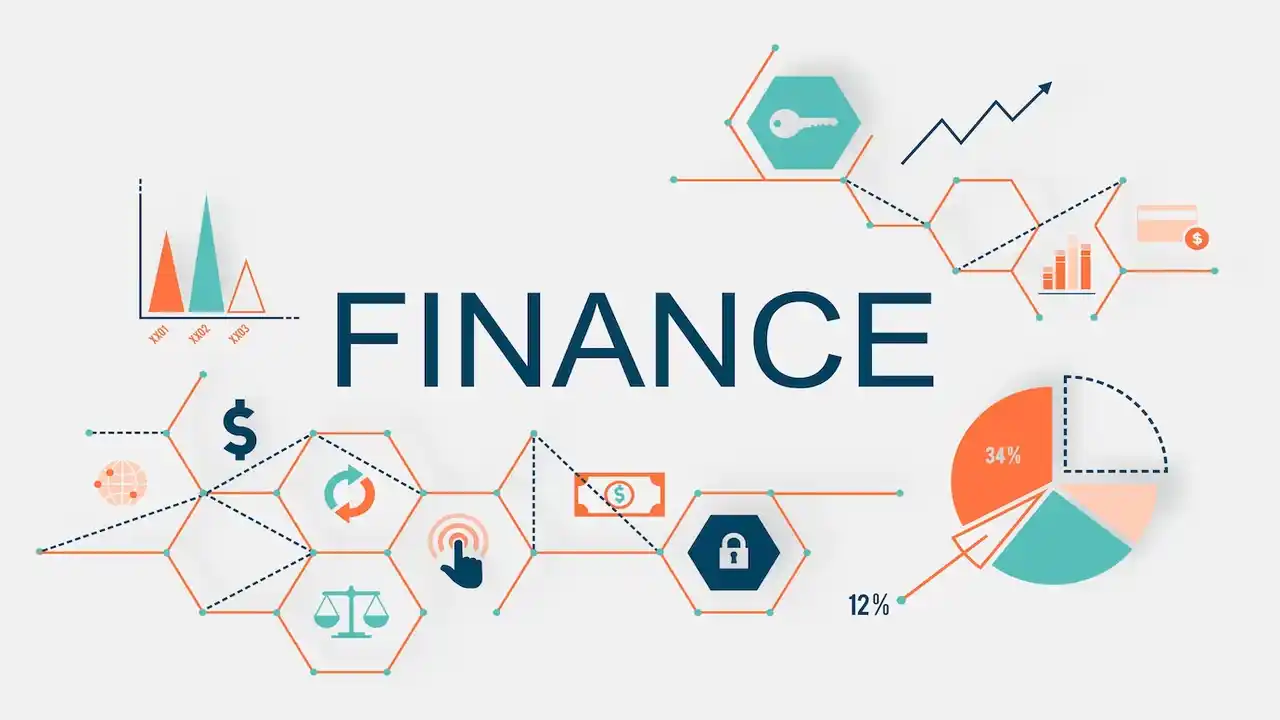Finance is a term that permeates many aspects of our lives, from personal budgeting to global economic policies. Yet, for many, the true meaning and scope of finance remain elusive. This comprehensive guide aims to demystify finance, exploring its definition, various branches, historical evolution, and its crucial role in both personal and global contexts. Whether you’re a student, a professional in a non-financial field, or simply someone looking to gain a deeper understanding of this fundamental concept, this article will provide you with valuable insights into the world of finance.
Defining Finance: More Than Just Money
At its core, finance is about the management of money and other assets. However, this simple definition barely scratches the surface of what finance truly encompasses.
The Broad Scope of Finance
Finance can be defined as the study and system of money, investments, and other financial instruments. It involves the dynamics of assets and liabilities over time under conditions of different degrees of uncertainty and risk. The field of finance deals with the concepts of time, money, risk, and how they are interrelated.
Key aspects of finance include:
- Resource Allocation: Deciding how to distribute limited financial resources across various potential uses.
- Time Value of Money: Understanding that money available now is worth more than the same amount in the future due to its potential earning capacity.
- Risk Management: Identifying, assessing, and mitigating financial risks.
- Financial Markets: The systems and mechanisms that facilitate the buying and selling of financial securities, commodities, and other fungible items.
Quote from Financial Expert: “Finance is not merely about making money. It’s about achieving our deep goals and protecting the fruits of our labor. It’s about stewardship and, therefore, about achieving the good society.” – Robert J. Shiller, Nobel Laureate in Economics
The Three Main Areas of Finance
Finance is typically divided into three main categories:
- Personal Finance:
- Deals with individual or family financial decisions
- Includes budgeting, saving, investing, mortgage planning, and retirement planning
- Focuses on maximizing individual or family financial well-being
- Corporate Finance:
- Concerned with financial decisions made by businesses
- Involves capital investment decisions, financing decisions, and dividend decisions
- Aims to maximize shareholder value while managing financial risks
- Public Finance:
- Relates to the financial decisions made by government entities
- Includes tax policies, government expenditures, budgeting, and debt issuance
- Focuses on the allocation of resources to meet public needs and promote economic stability
Understanding these distinctions is crucial as each area of finance operates under different principles and constraints, yet they are all interconnected in the broader financial ecosystem.
The Historical Evolution of Finance
The concept of finance has evolved significantly over time, shaped by historical events, technological advancements, and changing economic paradigms.
Ancient Roots of Financial Concepts
The origins of finance can be traced back to ancient civilizations:
- Mesopotamia (3000 BCE):
- Development of early banking systems
- Introduction of loans and interest
- Ancient Greece and Rome:
- Emergence of coinage and money-changing
- Development of maritime loans for trade
- Medieval Europe:
- Rise of merchant banking
- Introduction of double-entry bookkeeping in Italy (14th century)
These early developments laid the foundation for modern financial systems and concepts.
The Birth of Modern Finance
The modern era of finance began to take shape in the 17th and 18th centuries:
- 1602: Dutch East India Company becomes the first publicly traded company
- 1694: Establishment of the Bank of England
- 1792: Founding of the New York Stock Exchange
- 1800s: Development of modern banking systems and financial theories
Fact: The term “finance” comes from the French word “finer,” which means “to end” or “to settle.” This reflects the early use of finance in settling debts or finalizing transactions.
Finance in the 20th and 21st Centuries
The 20th century saw rapid advancements in financial theory and practice:
- 1952: Harry Markowitz introduces Modern Portfolio Theory
- 1958: Modigliani-Miller theorem on corporate finance and capital structure
- 1973: Black-Scholes model for options pricing
- 1990s: Rise of financial derivatives and complex financial instruments
- 2000s: Emergence of fintech and digital currencies
These developments have significantly expanded the scope and complexity of finance, leading to both innovations and challenges in the financial world.
Case Study: The 2008 Financial Crisis The 2008 global financial crisis highlighted the interconnectedness of modern finance and its impact on the broader economy. Triggered by the collapse of the U.S. housing market and exacerbated by complex financial instruments like collateralized debt obligations (CDOs), the crisis led to:
- The collapse of major financial institutions
- A global economic recession
- Sweeping regulatory changes in the financial industry
- Increased scrutiny of financial practices and risk management
This case study demonstrates the far-reaching implications of finance in the modern world and the importance of understanding its principles and practices.
The Language of Finance: Key Terms and Concepts
To truly understand finance, it’s essential to grasp its fundamental terms and concepts. These form the building blocks of financial knowledge and are crucial for navigating both personal and professional financial landscapes.
Essential Financial Terminology
- Assets: Resources owned by an individual or entity with economic value.
- Liabilities: Financial obligations or debts owed to others.
- Equity: The residual interest in the assets after deducting liabilities.
- Revenue: Income generated from business activities or investments.
- Expenses: Costs incurred in the process of generating revenue.
- Profit: The financial gain when revenue exceeds expenses.
- Loss: The financial loss when expenses exceed revenue.
- Cash Flow: The movement of money in and out of a business or personal account.
- Interest: The cost of borrowing money or the return on lending money.
- Dividend: A distribution of a portion of a company’s earnings to shareholders.
Understanding these terms is crucial for interpreting financial statements, making investment decisions, and managing personal or business finances.
Fundamental Financial Concepts
- Time Value of Money:
- The principle that money available now is worth more than the same amount in the future due to its potential earning capacity.
- Forms the basis for concepts like compound interest, present value, and future value.
- Risk and Return:
- The relationship between the potential return on an investment and its associated risk.
- Generally, higher potential returns come with higher risks.
- Diversification:
- The practice of spreading investments across various financial instruments to reduce risk.
- Based on the principle of “not putting all your eggs in one basket.”
- Liquidity:
- The ease with which an asset can be converted into cash without significant loss of value.
- Important for managing short-term financial needs and emergencies.
- Opportunity Cost:
- The potential benefit that is given up when choosing one alternative over another.
- Crucial for making informed financial decisions.
Quote from Warren Buffett: “Risk comes from not knowing what you’re doing.” This emphasizes the importance of understanding these fundamental concepts to make informed financial decisions.
The Role of Finance in Personal Life
Finance plays a crucial role in personal life, influencing decisions from daily budgeting to long-term retirement planning.
Personal Financial Planning
Personal financial planning is the process of managing your money to achieve personal economic satisfaction. It involves:
- Budgeting:
- Creating a plan for spending and saving
- Tracking income and expenses
- Ensuring expenses don’t exceed income
- Saving:
- Setting aside money for future use
- Building an emergency fund
- Saving for specific goals (e.g., home purchase, education)
- Investing:
- Putting money into financial assets with the expectation of generating returns
- Can include stocks, bonds, mutual funds, real estate, etc.
- Crucial for long-term wealth building and beating inflation
- Insurance:
- Protecting against financial losses
- Includes life insurance, health insurance, property insurance, etc.
- Tax Planning:
- Organizing finances to minimize tax liability
- Understanding tax implications of financial decisions
- Retirement Planning:
- Preparing financially for life after leaving the workforce
- Involves long-term saving and investing strategies
Fact: According to a 2021 survey by the Federal Reserve, 36% of Americans would be unable to cover a $400 emergency expense with cash or its equivalent, highlighting the importance of personal financial planning.
The Impact of Financial Literacy
Financial literacy – the ability to understand and effectively use various financial skills – is crucial for personal financial success. It impacts:
- Decision Making:
- Enables informed choices about saving, investing, and spending
- Helps in understanding financial products and services
- Financial Well-being:
- Reduces stress related to financial uncertainty
- Improves overall quality of life
- Economic Stability:
- Contributes to personal economic stability
- On a larger scale, contributes to economic growth and stability of communities and nations
Case Study: The Power of Financial Literacy A study conducted by the FINRA Investor Education Foundation found that individuals with high financial literacy were:
- More likely to have an emergency fund
- Less likely to engage in expensive credit card behaviors
- More likely to plan for retirement
- Better at managing debt
This demonstrates the tangible benefits of financial literacy in personal financial management.
Finance in the Business World
In the business world, finance serves as the lifeblood of organizations, influencing every aspect of their operations and strategies.
Corporate Finance: Maximizing Shareholder Value
Corporate finance focuses on maximizing shareholder value through financial decision-making. Key areas include:
- Capital Budgeting:
- Deciding which long-term investments or projects a company should undertake
- Involves analyzing the potential returns and risks of investments
- Capital Structure:
- Determining the mix of debt and equity financing a company should use
- Balancing the benefits of debt (e.g., tax shields) with its risks (e.g., bankruptcy costs)
- Working Capital Management:
- Managing short-term assets and liabilities to ensure operational efficiency
- Includes managing inventory, accounts receivable, and accounts payable
- Dividend Policy:
- Deciding how much of a company’s profits should be returned to shareholders as dividends
- Balancing shareholder returns with reinvestment in the business
Quote from Corporate Finance Expert: “Good corporate finance is all about balancing risk and reward. It’s not just about maximizing profits, but about creating sustainable value for shareholders and stakeholders alike.” – Dr. Emily Chen, Professor of Finance
Financial Markets and Institutions
Financial markets and institutions play a crucial role in allocating resources and facilitating the flow of capital in the economy:
- Stock Markets:
- Allow companies to raise capital by selling ownership shares to the public
- Provide liquidity for investors and a mechanism for price discovery
- Bond Markets:
- Enable governments and corporations to borrow money from investors
- Offer fixed-income investment opportunities
- Money Markets:
- Facilitate short-term borrowing and lending
- Important for managing liquidity in the financial system
- Foreign Exchange Markets:
- Allow for the exchange of different currencies
- Crucial for international trade and investment
- Financial Institutions:
- Include banks, insurance companies, investment firms, etc.
- Act as intermediaries between savers and borrowers
- Provide various financial services and products
Fact: As of 2021, the global stock market capitalization was approximately $95 trillion, highlighting the enormous scale of financial markets in the modern economy.
The Intersection of Finance and Technology
The rapid advancement of technology has significantly transformed the finance industry, giving rise to new tools, services, and business models.
The Rise of Fintech
Financial Technology, or Fintech, refers to the use of technology to deliver financial services and products. Key areas of fintech include:
- Digital Banking:
- Online and mobile banking services
- Neobanks offering fully digital banking experiences
- Payment Systems:
- Mobile payment platforms
- Peer-to-peer payment services
- Robo-Advisors:
- Automated investment management services
- Use algorithms to create and manage investment portfolios
- Blockchain and Cryptocurrencies:
- Decentralized finance (DeFi) platforms
- Digital currencies like Bitcoin and Ethereum
- Insurtech:
- Technology-driven innovations in the insurance industry
- Includes usage-based insurance, AI-powered underwriting, etc.
Case Study: The Impact of Fintech on Financial Inclusion M-Pesa, a mobile phone-based money transfer service launched in Kenya in 2007, has revolutionized access to financial services in East Africa. By 2021:
- Over 50 million users across 7 African countries
- Processes over 11 billion transactions annually
- Contributed to lifting 2% of Kenyan households out of extreme poverty
This case demonstrates how fintech can drive financial inclusion and economic development, particularly in underserved regions.
Artificial Intelligence and Big Data in Finance
AI and big data analytics are transforming various aspects of finance:
- Risk Assessment:
- AI algorithms analyzing vast amounts of data for more accurate credit scoring
- Machine learning models predicting market trends and investment risks
- Fraud Detection:
- AI-powered systems identifying unusual patterns indicative of fraudulent activities
- Real-time monitoring and alerts for potential security breaches
- Personalized Financial Services:
- AI-driven chatbots providing customer support and financial advice
- Big data analytics enabling highly personalized financial product recommendations
- Algorithmic Trading:
- High-frequency trading systems executing large volumes of trades in microseconds
- AI models making trading decisions based on market data analysis
Quote from Fintech Expert: “AI and big data are not just enhancing existing financial services; they’re completely reimagining how finance works. We’re moving towards a future where financial decisions are increasingly data-driven and personalized.” – Sarah Johnson, Fintech Innovator
The Global Impact of Finance
Finance plays a critical role in shaping the global economy and international relations.
International Finance and Global Markets
International finance deals with the financial interactions between countries and the operation of global financial markets:
- Foreign Direct Investment (FDI):
- Investment made by a company or individual in business interests located in another country
- Drives economic growth and facilitates technology transfer
- Exchange Rates:
- The rate at which one currency can be exchanged for another
- Impacts international trade and investment flows
- Balance of Payments:
- A record of all transactions between a country and the rest of the world
- Includes trade in goods and services, financial flows, and transfers
- Global Financial Centers:
- Cities that serve as hubs for international financial activities
- Examples include New York, London, Singapore, and Hong Kong
Fact: According to the United Nations Conference on Trade and Development (UNCTAD), global FDI flows were $1.5 trillion in 2021, demonstrating the massive scale of international financial activity.
Finance and Economic Development
Finance plays a crucial role in fostering economic development, particularly in emerging markets:
- Capital Allocation:
- Efficient financial systems direct capital to its most productive uses
- Facilitates entrepreneurship and innovation
- Risk Management:
- Financial instruments allow for the sharing and diversification of risks
- Enables businesses and individuals to undertake productive but risky ventures
- Financial Inclusion:
- Access to financial services for underserved populations
- Includes microfinance initiatives and mobile banking solutions
- Infrastructure Financing:
- Financial markets enable the funding of large-scale infrastructure projects
- Critical for economic growth and development
Case Study: The Asian Development Bank (ADB) The ADB, established in 1966, has played a significant role in financing economic development in Asia and the Pacific. As of 2021:
- Committed $22.8 billion in loans, grants, and other forms of financing
- Focused on infrastructure, health systems, and economic recovery from the COVID-19 pandemic
- Contributed to poverty reduction and improved living standards across the region
This case illustrates how financial institutions can drive economic development on a regional and global scale.
The Pervasive Nature of Finance
As we’ve explored throughout this comprehensive guide, finance is far more than just a matter of money. It’s a multifaceted field that touches nearly every aspect of our lives and the global economy. From personal budgeting to international economic policies, finance provides the framework for making informed decisions about resource allocation, risk management, and value creation.
Key Takeaways:
- Broad Scope: Finance encompasses personal, corporate, and public domains, each with its unique principles and challenges.
- Historical Evolution: The concept of finance has evolved significantly over time, shaped by historical events, technological advancements, and changing economic paradigms.
- Fundamental Concepts: Understanding key financial terms and concepts is crucial for navigating both personal and professional financial landscapes.
- Personal Impact: Finance plays a vital role in personal life, influencing decisions from daily budgeting to long-term retirement planning.
- Business World: In the corporate sphere, finance serves as the lifeblood of organizations, driving decision-making and strategy.
- Technological Integration: The intersection of finance and technology has given rise to fintech, revolutionizing how financial services are delivered and consumed.
- Global Influence: Finance has a profound impact on the global economy, shaping international relations and driving economic development.
The Future of Finance
As we look to the future, several trends are likely to shape the evolution of finance:
- Increased Digitalization:
- Continued growth of digital banking and payment systems
- Further integration of AI and machine learning in financial services
- Sustainability Focus:
- Growing importance of Environmental, Social, and Governance (ESG) factors in investment decisions
- Development of new financial instruments to address climate change and other global challenges
- Decentralization:
- Expansion of blockchain technology and cryptocurrencies
- Potential reshaping of traditional financial intermediaries
- Financial Inclusion:
- Increased efforts to provide access to financial services for underserved populations
- Development of innovative solutions to address global wealth inequality
- Regulatory Evolution:
- Ongoing adaptation of financial regulations to keep pace with technological advancements
- Potential for increased global cooperation in financial regulation
Quote from Financial Futurist: “The future of finance will be characterized by greater accessibility, transparency, and personalization. Technology will continue to break down barriers, but the fundamental principles of sound financial management will remain as important as ever.” – Dr. Maya Patel, Financial Innovation Researcher
The Importance of Financial Literacy in the Modern World
As finance continues to evolve and permeate various aspects of our lives, the importance of financial literacy cannot be overstated. In an increasingly complex financial landscape, the ability to understand and effectively use financial skills is crucial for:
- Personal Empowerment:
- Making informed decisions about saving, spending, and investing
- Achieving long-term financial goals and security
- Economic Stability:
- Contributing to overall economic health by making sound financial choices
- Reducing the risk of financial crises caused by widespread financial mismanagement
- Social Equity:
- Bridging the wealth gap by providing individuals with the knowledge to build and manage wealth
- Empowering underserved communities to participate more fully in the financial system
- Technological Adaptation:
- Navigating the rapidly evolving world of fintech and digital financial services
- Protecting oneself from financial fraud and cybersecurity risks
Fact: A study by the FINRA Investor Education Foundation found that individuals with high financial literacy are 2.5 times more likely to be able to cover a $2,000 emergency expense compared to those with low financial literacy.
Embracing the Multifaceted Nature of Finance
As we conclude this exploration of the meaning of finance, it’s clear that finance is not just a field of study or a career path – it’s a fundamental aspect of modern life that influences individual well-being, business success, and global prosperity.
Whether you’re a student considering a career in finance, a professional looking to better understand the financial aspects of your industry, or simply someone seeking to improve your personal financial management, developing a solid understanding of finance is an invaluable investment in your future.
Key Steps for Enhancing Your Financial Understanding:
- Continuous Learning: Stay informed about financial news and trends
- Practical Application: Apply financial principles in your personal life and professional roles
- Seek Expert Advice: Consult with financial professionals for complex financial decisions
- Embrace Technology: Utilize financial tools and apps to enhance your financial management
- Share Knowledge: Contribute to financial literacy in your community by sharing your understanding with others
Remember, finance is not just about numbers – it’s about making informed decisions that create value and drive progress. By demystifying finance and embracing its principles, we can all contribute to a more financially literate and economically stable world.
As we navigate an increasingly complex and interconnected global economy, a solid understanding of finance will continue to be a valuable asset. Whether you’re managing your personal finances, running a business, or shaping economic policy, the principles of finance provide a powerful framework for decision-making and value creation.
In conclusion, finance is more than just a means to an end – it’s a lens through which we can understand and shape the world around us. By embracing the multifaceted nature of finance and continuing to expand our financial knowledge, we can unlock new opportunities for personal growth, professional success, and societal progress. The journey to financial understanding is ongoing, but with each step, we become better equipped to navigate the complex financial landscape of the modern world.



